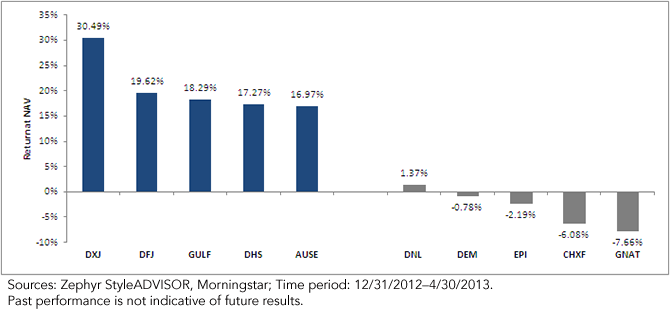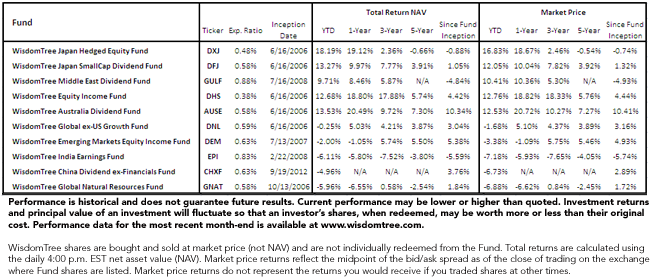WisdomTree's Best and Worst Performing Equity Funds in 2013



 The “Bottom 5”
WisdomTree’s five worst-performing equity ETFs on a year-to-date basis may represent some pockets of underlying relative value —the types of areas where a contrarian investor may want to focus.
• GNAT: This fund focuses on equities within natural resource sectors, and it is the worst-performing of all WisdomTree’s equity funds year-to-date. However, if we compare the price-to-earnings (P/E) ratio to the S&P 500 Index, a commonly used benchmark for the performance of U.S. equities, it is approximately 20% lower. Generally speaking, natural resources are necessary inputs to fuel overall global growth, so this recent negative performance could be an opportunity.
• Emerging Markets: DEM, EPI, and CHXF all fit a common theme of different ways in which to generate exposure to emerging markets. Each has a negative return year-to-date. We believe the relative underperformance of emerging market equities could provide an attractive entry point and good relative value compared to the United States, which has been a particularly good performer over the same period.
• DNL: This is the only positive performer among WisdomTree’s “bottom 5,” and a big reason for its performance issues has been exposure to emerging markets. Developed market growth-oriented equities (measured by the MSCI EAFE Growth Index) have actually delivered much stronger returns during this period, but DNL was hurt by bringing in some significant emerging market exposure, including companies in Brazil, South Africa, China and Mexico. Also, being under-weight in Japan compared to the MSCI EAFE Growth Index was not helpful.
Conclusion
While there is truly no way to predict future inflection points for different funds, we believe it is always interesting to consider both sides of the performance spectrum. Top-performing funds are typically well-noted, garnering significant attention. Much less noted are the bottom performers—and at times these could have the potential to be the top performers of tomorrow.
1As represented by the MSCI Japan Local Currency Index.
2As represented by the S&P 500 Index.
3Sectors: S&P 500 Consumer Staples, Health Care, Telecommunication Services and Utilities Indexes.
4As represented by the WisdomTree Middle East Dividend Index.
5As represented by the WisdomTree Australia Dividend Index.
The “Bottom 5”
WisdomTree’s five worst-performing equity ETFs on a year-to-date basis may represent some pockets of underlying relative value —the types of areas where a contrarian investor may want to focus.
• GNAT: This fund focuses on equities within natural resource sectors, and it is the worst-performing of all WisdomTree’s equity funds year-to-date. However, if we compare the price-to-earnings (P/E) ratio to the S&P 500 Index, a commonly used benchmark for the performance of U.S. equities, it is approximately 20% lower. Generally speaking, natural resources are necessary inputs to fuel overall global growth, so this recent negative performance could be an opportunity.
• Emerging Markets: DEM, EPI, and CHXF all fit a common theme of different ways in which to generate exposure to emerging markets. Each has a negative return year-to-date. We believe the relative underperformance of emerging market equities could provide an attractive entry point and good relative value compared to the United States, which has been a particularly good performer over the same period.
• DNL: This is the only positive performer among WisdomTree’s “bottom 5,” and a big reason for its performance issues has been exposure to emerging markets. Developed market growth-oriented equities (measured by the MSCI EAFE Growth Index) have actually delivered much stronger returns during this period, but DNL was hurt by bringing in some significant emerging market exposure, including companies in Brazil, South Africa, China and Mexico. Also, being under-weight in Japan compared to the MSCI EAFE Growth Index was not helpful.
Conclusion
While there is truly no way to predict future inflection points for different funds, we believe it is always interesting to consider both sides of the performance spectrum. Top-performing funds are typically well-noted, garnering significant attention. Much less noted are the bottom performers—and at times these could have the potential to be the top performers of tomorrow.
1As represented by the MSCI Japan Local Currency Index.
2As represented by the S&P 500 Index.
3Sectors: S&P 500 Consumer Staples, Health Care, Telecommunication Services and Utilities Indexes.
4As represented by the WisdomTree Middle East Dividend Index.
5As represented by the WisdomTree Australia Dividend Index. Important Risks Related to this Article
There are risks associated with investing, including possible loss of principal. Foreign investing involves special risks, such as risk of loss from currency fluctuation or political or economic uncertainty. Investments in real estate involve additional special risks, such as credit risk, interest rate fluctuations and the effect of varied economic conditions. Funds that focus their investments in one country or region may be significantly impacted by events and developments associated with the region, which can adversely affect performance. Funds focusing on a single sector and/or smaller companies generally experience greater price volatility. Investments in emerging, offshore or frontier markets are generally less liquid and less efficient than investments in developed markets and are subject to additional risks, such as risks of adverse governmental regulation, intervention and political developments. Due to the investment strategy of certain Funds, they may make higher capital gain distributions than other ETFs. Please read the Funds’ prospectus for specific details regarding the Funds’ risk profile. Funds that focus their investments in one country or region may be significantly impacted by events and developments associated with the region which can adversely affect performance. Funds focusing on a single sector and/or smaller companies generally experience greater price volatility. Investments in emerging, offshore or frontier markets are generally less liquid and less efficient than investments in developed markets and are subject to additional risks, such as risks of adverse governmental regulation, intervention and political developments. You cannot invest directly in an index.

Jeremy Schwartz has served as our Global Chief Investment Officer since November 2021 and leads WisdomTree’s investment strategy team in the construction of WisdomTree’s equity Indexes, quantitative active strategies and multi-asset Model Portfolios. Jeremy joined WisdomTree in May 2005 as a Senior Analyst, adding Deputy Director of Research to his responsibilities in February 2007. He served as Director of Research from October 2008 to October 2018 and as Global Head of Research from November 2018 to November 2021. Before joining WisdomTree, he was a head research assistant for Professor Jeremy Siegel and, in 2022, became his co-author on the sixth edition of the book Stocks for the Long Run. Jeremy is also co-author of the Financial Analysts Journal paper “What Happened to the Original Stocks in the S&P 500?” He received his B.S. in economics from The Wharton School of the University of Pennsylvania and hosts the Wharton Business Radio program Behind the Markets on SiriusXM 132. Jeremy is a member of the CFA Society of Philadelphia.

